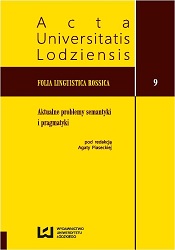РОЛЬ ЯЗЫКА В ФОРМИРОВАНИИ ИДЕНТИЧНОСТИ ГРАЖДАН В ПОСТСОВЕТСКОМ ПРОСТРАНСТВЕ (НА ПРИМЕРЕ КАЗАХСТАНА)
THE ROLE OF LANGUAGE IN FORMATION OF CITIZEN’S IDENTITY IN THE POST-SOVIET COUNTRIES (ON THE EXAMPLE OF KAZAKHSTAN)
Author(s): Damina ShaybakovaSubject(s): Language and Literature Studies
Published by: Wydawnictwo Uniwersytetu Łódzkiego
Summary/Abstract: The article considers the role of language in formation of citizen’s identity in the post-Soviet countries. It deals with possibilities of identityʼs determination, basing on the concepts of nationalism and ethnicity on the example of Kazakhstan. The author states that nationalism is not connected directly with language, but for ethnicity it is one of the basic concepts. Language identity reveals not only from the status characteristics in the context of discourse within post-Soviet countries, but also as a way of influence on social consciousness. Finally, the paper discusses the way of how the meta-language shapes the thinking stereotype about identity.
Journal: Acta Universitatis Lodziensis. Folia Linguistica Rossica
- Issue Year: 2013
- Issue No: 9
- Page Range: 107-116
- Page Count: 10
- Language: Polish

